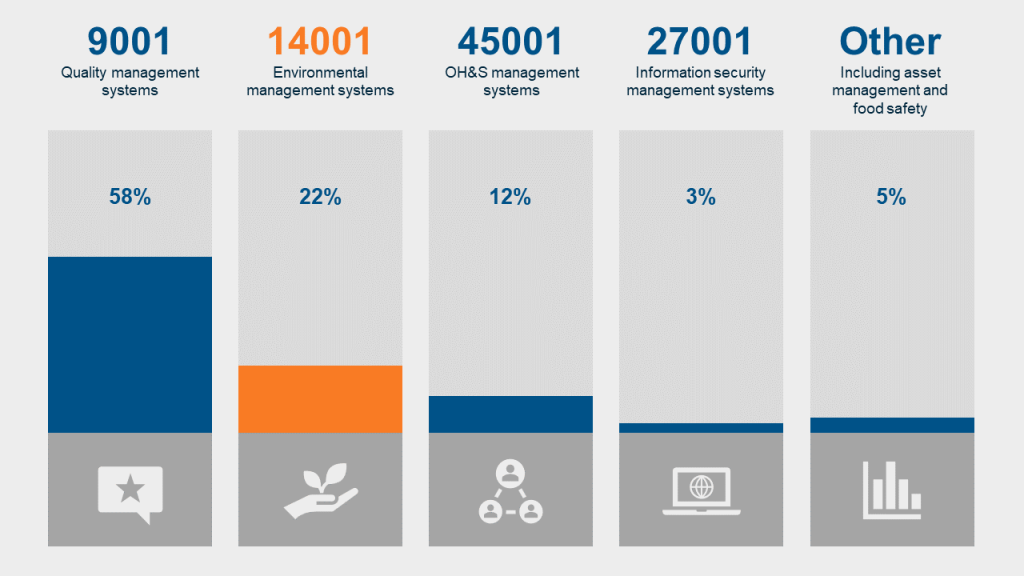Earth Day, held annually on April 22, is regarded as one of the world’s biggest secular observance days, involving more than 1 billion people in 193 countries across the globe[1]https://www.earthday.org/history/. This year’s Earth Day theme is “Invest In Our Planet”.
There are many ways we, as individuals, can help invest in our planet to help reduce our carbon footprint. Businesses also have a vital role to play. Implementation of an Environmental Management System such as ISO 14001:2015 is one way businesses can demonstrate their commitment to managing and improving their environmental performance.
What is ISO 14001?
ISO 14001:2015 provides the framework for businesses to help protect the environment and respond to changing conditions. The standard allows organisations to better manage their environmental aspects and reduce the associated impacts on a local, national, or international scale. According to ISO, ‘“it is applicable to any organisation, regardless of size, type, and nature, and applies to the environmental aspects of its activities, products and services that the organization determines it can either control or influence considering a life cycle perspective.[2]https://www.iso.org/standard/60857.html”
Why do we need ISO 14001?
Environmental, Social and Governance (ESG) issues and reporting are becoming a growing concern for businesses of all sizes. While not all ESG reporting is related to regulatory reporting requirements, implementing a standard such as ISO 14001:2015 can help ensure a business meets various elements of its ESG obligations.
In addition, a growing world focus on environmental issues such as climate change and Net Zero by 2050, means stakeholders are demanding businesses use sustainable business practices and hold those who do not to account. Independent certification to a standard such as ISO 14001:2015 demonstrates that a business understands the environmental aspects related to its activities, products and services, the environmental conditions it impacts, and the specific impacts or changes to the environment, considering a lifecycle perspective. This has a flow-on effect of improving the business’ image as a responsible corporate citizen, enhancing their reputation in the market.
ISO 14001 by the numbers
An analysis of the ISO Survey data from 2018 to 2020 shows that more and more businesses want to demonstrate their commitment to sustainability. The data shows year on year increases in certification to ISO 14001:2015 both globally and in Australia. There was an 11% increase in certification to ISO 14001:2015 globally in 2020 and a 30% increase in Australia alone. Australia has moved from 25th place in the total number of 14001 certifications in 2018, to 22nd in 2019, to 15th in 2020. The top five countries with certification to ISO 14001 remain steady over the three years, with China, Japan, Italy, Spain, and the United Kingdom all holding their places year on year. Certification to ISO 14001:2015 makes up more than 20% of all certifications to ISO standards globally[3]https://isotc.iso.org/livelink/livelink?func=ll&objId=18808772&objAction=browse&viewType=1.

What value can ISO 14001 add to your business?
Businesses across the globe are seeing the benefits of being certified to a standard such as ISO 14001:2015. In addition to demonstrating good corporate citizenship and meeting ESG requirements, certification to ISO 14001 has the following benefits:
- Brings a systematic approach to environmental management
- Gives management with tools to build success over the long term
- Identifies risks to mitigate or prevent adverse environmental impacts and leverage opportunities to enhance beneficial ones
- Reduces costs – managing resources and waste can reduce overheads and costs
- Protects against potential legislated penalties
- Brings greater opportunities as stakeholders are more likely to want to work with those who demonstrate commitment to their environmental responsibilities
- Increases employee satisfaction with those who are motivated by their organisation’s commitment to sustainability and environmental protection
“Organisations have realised significant value from ISO 14001 in terms of meeting legal requirements, improving environmental performance, and enhancing management commitment and stakeholder engagement.”
– ISO Environmental management systems technical committee, ISO/TC 207/SC1
Find out more on ISO 14001 management systems training


